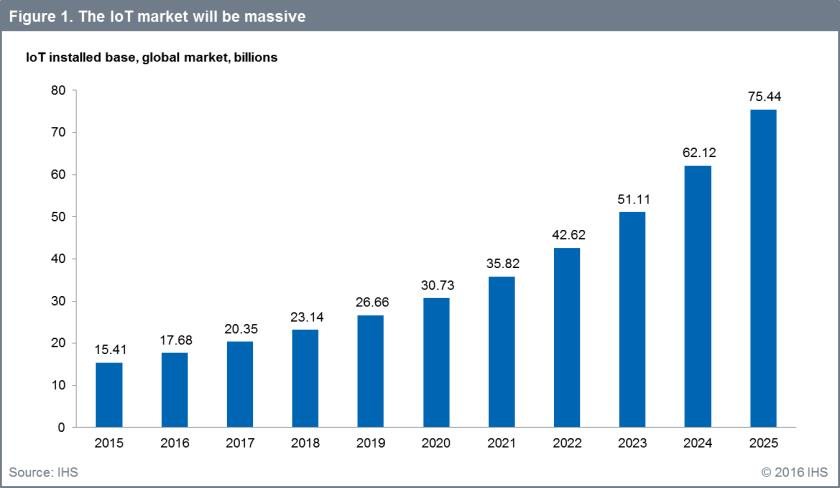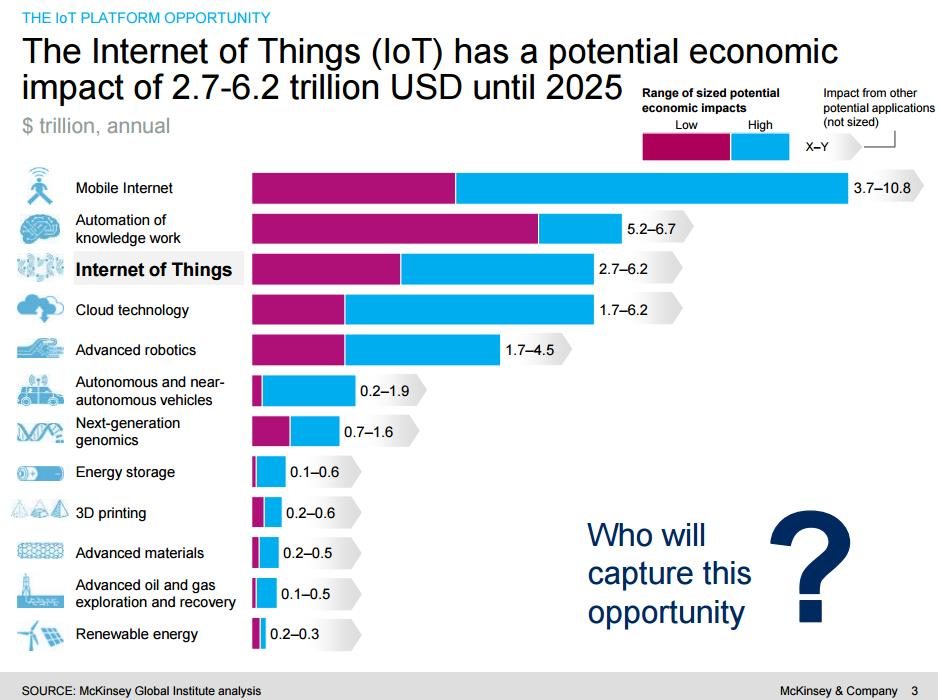
We are already entering the fourth-generation internet, the internet of things, but it won’t really take off until the next decade, the 2020s. Sure, we have self-driving Teslas and Nest home appliances, along with Samsung’s Smart Things, but it’s not mainstream yet. For example, none of my friends has a self-driving car yet.
This will change though, and it’s not just things on the internet, but a whole raft of technologies from robotics to artificial intelligence to machine learning, combined with IoT that will make it happen. These technologies are playing into every aspect of our lives, from street lighting to gene editing, and is transforming our world into a connected smart structure.
The idea is that you can place a chip inside anything and make it smart. Smart roads, smart buildings, smart cities, smarter people. In the next decade of the internet, a number of key developments will come into play to start building the semantic web or web 5.0.
In other words, whether we consciously know this or not, we are building a smart planet where everyone and everything is connected and communicating non-stop. How many things are connected in this future planet?
There are various estimates.
Research house IHS Markit estimate 78 billion things communicating by 2025.
McKinsey say this will be a multi-trillion dollar market that, after the mobile internet and artificial intelligence, will be the most impactful technologies for the next decade.
And, if you like that sort of thing, Forbes do an annual roundup of what the research firms are thinking about IoT, including other headline grabbers like:
Bain predicts that by 2020 annual revenues could exceed $470B for the IoT vendors selling the hardware, software and comprehensive solutions; and
General Electric predicts investment in the Industrial Internet of Things (IoT) is expected to top $60 trillion during the next 15 years.
This is big.
In my own mind, I’m just thinking that I’ll have a TV, car, fridge, heating system, desktop or tablet or both, mobile and watch, health monitor possibly swallowed and inside me, robot to look after the house, security system, dog, children and automated personal assistant all on the net. That’s 15 things on the net just for me. Then my wife and kids will have a few things, probably at least 5 each. So, in a typical household in a developed economy, there will be an average 30 things on the internet. Bearing in mind we are in a developed economy, there will be smart governments who will roll out a further average 5 things on the net per person, e.g. security monitors, car sensors on the roads, automated toll systems, tracking services and such like.
My household of four people has just added another 20 things to the internet, thanks to the government. So, we’re looking at a minimum 10 things per person in a developed economy online.
In developing economies and in countries where some of the society are excluded or have less inclusion, there will still be a lot of things on the internet supporting them. Definitely a mobile device, but equally government monitoring systems and smarter infrastructure. For the purposes of this blog entry, I am going to be conservative and estimate that two-thirds of Earth’s population which, by 2025, will have risen to 8 billion people. Let’s say that the United Nations are on track to increase inclusion by that time – it is one of their sustainable goals - and only half the planet are in poorer conditions, compared to two-thirds today, and you have four billion people with an average of five things on the internet monitoring their activities, and four billion with ten things, of which five are for their lifestyle and five are for the government.
That’s a minimum of sixty billion things on the internet, and these things are communicating non-stop. The fact they are communicating means they have intel inside, and that means they can transact. If sixty billion things are trading and transacting non-stop, 24 by 7, you’re talking trillions of transactions. It wouldn’t surprise me in fact, that there may be billions of things transacting trillions of times a minute in very small amounts, all day long.
What is the financial system that will support that structure of operation and how will it know what things are allowed to transact with which?
Again, you can find the detailed answer in ValueWeb and a core question here is how machines are authorised to trade on behalf of humans, and when do the machines need to be kept in check? For example, if my fridge orders 12 bottles of white wine when it usually orders six, is that a mistake? Should it be verified? And how often does the human want to verify what their fridge – tv, car, house, etc – is doing? Equally, how does the bank know that the fridge – tv, car, house, etc –belongs to that human, and what they’ve authorised it to do?
This is something that leads us naturally into a digital identity discussion … or does it? To be honest, the more I think about my internet of things, the more I think my things will be wrapped up in a mobile wallet. This is why the Alipay (China), Paytm (India), Vipps (Nordic) and Venmo/PayPal (USA) become so key, because these wallets can wrap a range of things inside, and aggregate the payments they need to make. This is the real underlying play by Apple Pay.
After all, I have my mobile (iPhone), watch (Apple), tv (Apple TV), car (soon to be self-driving Apple car) and more. They are all in my Apple account for which they Apple Pay. So when I ask the question:
When you have billions of devices transacting trillions of times a minute in very small amounts, what is the financial system you use to support it?
It doesn’t have to be blockchain, machine learning, data analytics and cloud – although in the back office, these technologies will create new and dynamic efficiencies – but if you really want to take away the friction of transacting, then the device aggregators will win, and those device aggregators are already out there doing their thing. By aggregating devices, you can aggregate their transactions and, thereby, allow trillions of transactions amongst billions of devices non-stop, and then bill once monthly.
Such a neat and under-recognised idea that when we do wake up to what these guys are doing, we’re going to go wow, just wow.
Meanwhile, another facet of IoT worth touching on to conclude is that if you have a smart house, a self-driving car and health monitor chip inside, what happens to insurance? More insurance is taken because of risk, but if self-driving cars never crash, there is no risk. A smart house will know when you’re in or out and will tell you if someone who shouldn’t be there is in. If your health is continually monitored, analysed and reported, then do you need health insurance?
As smart things, smart cities and smart networks connect everything, risk reduces dramatically. Traditional risks anyway. But what about the risk of your machine doing something it shouldn’t? The risk of your health chip breaking down? The risk of your house monitor failing?
In fact, what I’ve started to see is insurers using smart houses and smart things to manage risk better for you. An example: the insurer knows if you’ve left the house and left a window open or a light on, and can tell you.
Interesting times indeed.
You can read more about the fourth-generation internet of things in a few other related blog posts:
- Who owns the customer in the internet of things?
- The imminent world of artificially intelligent everything
- Next generation insurance and the future of humanity
- We are the Robots: science fiction becomes science fact
- We are the Robots: speech by Andy Haldane of the Bank of England
- We must automate humanity
- You can never automate humanity
- Robots against Humans is like Spock against Kirk
Equally, if you don’t want to read more about my spin on IoT and finance, you can always read these research reports freely available on the internet of things today:
- The Internet of Things: An Overview - Internet Society
- The Internet of Things - Deutsche Bank
- Internet of Things - EY
- Internet of Things - TCS
- PDF Brochure The Internet of Things: Evolution or Revolution? - AIG.com
- The Internet of Things: Mapping the value beyond the hype - McKinsey
- The Internet of Things: Making sense of the next ... - Goldman Sachs
- From Products to Services: The Next Internet of Things - DBS Bank
- What the Internet of Things brings to Banking - Temenos
- The Impact of the Internet of Things on Financial Services - Capgemini
- IoT-enabled Banking Services - Infosys
- Financial services in the age of the Internet of Things - Deloitte
- Enabling The Internet Of Things For Banks - ACI Worldwide
- Gearing Up for the Internet of Payments - Cognizant
Chris M Skinner
Chris Skinner is best known as an independent commentator on the financial markets through his blog, TheFinanser.com, as author of the bestselling book Digital Bank, and Chair of the European networking forum the Financial Services Club. He has been voted one of the most influential people in banking by The Financial Brand (as well as one of the best blogs), a FinTech Titan (Next Bank), one of the Fintech Leaders you need to follow (City AM, Deluxe and Jax Finance), as well as one of the Top 40 most influential people in financial technology by the Wall Street Journal's Financial News. To learn more click here...



